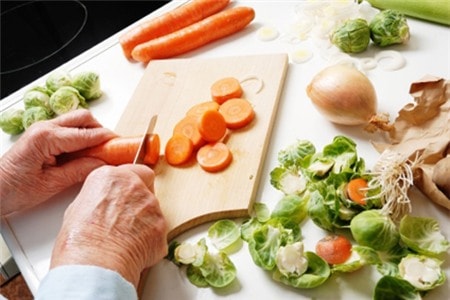The secret to eating to stay young forever
Aging is an inevitable process in life, although everyone wants to slow it down. Proper nutrition is one of the important measures to help prevent changes and disorders in organs and body systems in the elderly.
According to Dr. Tran Thi Minh Hanh, Deputy Director of the Ho Chi Minh City Nutrition Center, the aging process is often accompanied by a decrease in energy needs due to decreased physical activity and decreased basal metabolism. As people age, many do not eat enough due to fatigue, lethargy and lack of interest in life. Increased activity can increase appetite and thus help the body receive enough energy and necessary nutrients.
1. Protein
The amount of protein synthesized each day decreases very little with age. The normal protein requirement is about 55-60g per day. As we age, our ability to digest and absorb protein becomes worse, and our ability to synthesize protein also decreases, so protein deficiency is very likely to occur.
The process of protein decomposition in the large intestine creates putrid waste and toxins that, if constipated for a long time, will have a negative impact on health (especially protein from meat). Therefore, the elderly should limit meat, especially fatty meat. Instead, they should eat fish, ensuring at least 3 fish meals a week because fish contains a lot of easily digestible protein, and also has some essential fatty acids for the body that have a protective effect. In addition, animal protein should also be replaced with some vegetable protein such as soybeans, cowpeas, peas, green beans...
 Proper nutrition is one of the important measures to help slow down aging. Photo: forenergy.
Proper nutrition is one of the important measures to help slow down aging. Photo: forenergy.
Carbohydrates are divided into two groups: fast-absorbing carbohydrates (including glucose, fructose, sucrose) and slow-absorbing carbohydrates (including starch, glycogen).
Carbohydrates are the main component of food. The absorption of this compound in the elderly is reduced, so it is necessary to reduce its use in meals, especially fast-absorbing types. Specifically, it is necessary to limit cane sugar, candy, soft drinks... It is advisable to use whole grains, potatoes, corn, noodles, pasta...
3. Fat
Omega-3 and omega-6 are essential fatty acids for the body. Omega-3 is abundant in soybeans, canola oil, fish, algae, seaweed, and helps prevent heart disease and cancer. Omega-6 is found in sesame oil, soybeans, peanuts, sunflowers, and corn.
Cholesterol is the main substance that makes up cell membranes and is the raw material for sex hormones. Cholesterol combines with fatty acids and proteins to create lipoproteins that protect the heart. Excess cholesterol can easily cause atherosclerosis and cerebral thrombosis, but a deficiency can also weaken cell membranes, leading to cerebral hemorrhage. Cholesterol is abundant in animal fat, egg yolks, and viscera. Elderly people should limit fat, especially animal fat, and replace it with vegetable oil. The recommended dietary cholesterol intake is less than 300 mg per day.
4. Water, vitamins and minerals
It is important to drink water regularly even if you are not thirsty, especially in the summer. Digestion and absorption in the elderly are often worse than when they are young. Therefore, they are prone to lack of vitamins, potassium, intracellular magnesium, calcium deficiency causing osteoporosis (especially in postmenopausal women), iron deficiency anemia causing fatigue, dizziness, memory loss, zinc deficiency causing anorexia, memory loss, poor concentration, dry skin, dark skin...
Foods rich in calcium are milk and dairy products, shrimp and prawns eaten with the shell, small fish with bones, soybeans, tofu, and green vegetables. Milk is a food rich in calcium and contains a lot of valuable protein. Therefore, you should drink 1-2 glasses of milk every day, choose milk that contains little or no fat and sugar.
Foods rich in iron are meat, fish, liver, blood, eggs, beans, and green vegetables. Zinc is abundant in animal foods, especially fish, meat, and seafood, especially oysters. Potassium is abundant in vegetables and fruits.
5. Fiber
Fiber helps eliminate toxins through the digestive tract, limits constipation, and reduces the absorption of cholesterol from the diet into the body. Fiber is abundant in whole grains, vegetables, and fruits.
To get enough vitamins and fiber, you should eat about 200-300g of vegetables and 2-3 portions of fruit per day. 1 portion of fruit is equivalent to 1 banana, 1 orange, 1 medium pear or 1/2 glass of fruit juice. Choose colorful fruits and vegetables, prepare them simply to limit the loss of nutrients during cooking. When eating fruit, eat the whole fruit to get more fiber than just juicing.
6. Choose antioxidant foods
Drink lots of tea, green tea, eat lots of vegetables, especially green leafy vegetables such as water spinach, Malabar spinach, amaranth, jute, Malabar spinach, eat lots of spices such as onions, chives, herbs... Eat spices such as garlic, ginger, galangal, turmeric..., eat lots of ripe fruit to provide the body with lots of vitamins, minerals and antioxidants. Limit stress because it will increase free radicals.
7. Limit salt and salty foods
Salt is a common daily spice but the body only needs a very small amount, about 3-5g. The habit of eating salty foods will lead to high blood pressure. Therefore, you should limit salt or salty foods (fish sauce, dried foods, pickles, canned foods...) in your diet.
According to Vnexpress - PC






